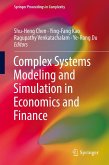This book expands the foundations of general systems theory to enable progress beyond the rich heuristic practices available today. It establishes a foundational framework for the development of scientific transdisciplinary systems principles and shows how these can amplify the potential of individuals and teams working in multi-, inter- and transdisciplinary contexts or striving to translate their progress across disciplinary boundaries. Three general scientific systems principles are presented, and their relevance to the design, analysis, management and transformation of systems is explored.
Applying lessons from the history and philosophy science, this book disambiguates key concepts of general systemology, clarifies the role of general systemology within the field of systemology, and explains how general systemology supports other forms of transdisciplinarity. These insights are used to develop new perspectives, strategies and tools for addressing long-standing challenges to the advancement and transdisciplinary application of general insights into the nature of complex systems.
The material presented in this book includes comprehensive models of the structure of systemology as a disciplinary field, the structure and significance of the general systems worldview, and the role of general systemology as the heart of systems science, systems engineering and systems practice. It explains what a fully-fledged general theory of systems would look like, what its potential is, what routes are available to us to develop it further, and how to leverage the knowledge we have attained so far.
Many examples and analogies show how general systemology has the potential to enable scientific discovery, insightful theory building, and practical innovation in all the disciplines as they study, design, nurture or transform complex systems. This book is essential reading for anyone wishing to master the concepts, terminology, models and strategies needed to make effective use of current general systems knowledge and to engage in the further development of the philosophy, science, and practice of general systemology.
Applying lessons from the history and philosophy science, this book disambiguates key concepts of general systemology, clarifies the role of general systemology within the field of systemology, and explains how general systemology supports other forms of transdisciplinarity. These insights are used to develop new perspectives, strategies and tools for addressing long-standing challenges to the advancement and transdisciplinary application of general insights into the nature of complex systems.
The material presented in this book includes comprehensive models of the structure of systemology as a disciplinary field, the structure and significance of the general systems worldview, and the role of general systemology as the heart of systems science, systems engineering and systems practice. It explains what a fully-fledged general theory of systems would look like, what its potential is, what routes are available to us to develop it further, and how to leverage the knowledge we have attained so far.
Many examples and analogies show how general systemology has the potential to enable scientific discovery, insightful theory building, and practical innovation in all the disciplines as they study, design, nurture or transform complex systems. This book is essential reading for anyone wishing to master the concepts, terminology, models and strategies needed to make effective use of current general systems knowledge and to engage in the further development of the philosophy, science, and practice of general systemology.








